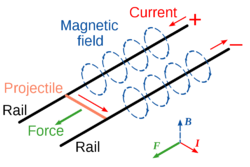| There is more information available on this subject at Railgun on the English Wikipedia. |
A railgun, alternatively spelled rail gun, is a type of electromagnetic projectile weapon. While often confused with coilguns, rather than accelerating their projectiles through the use of magnetic coils, railguns, as their name suggests, utilize magnetic rails to perform this task. More precisely, a railgun accelerates a conductive projectile along a pair of metal rails, using two sliding or rolling contacts that permit a large electric current to pass through the projectile. This current interacts with the strong magnetic fields generated by the rails and this accelerates the projectile.
A handful of railguns are used by the armed military forces of humanity, including those of the United Nations Space Command and Colonial Military Authority. They are predominantly mounted on vehicles for use as fixed artillery emplacements, and can be divided into two broad categories - Light and Heavy Railguns, respectively. They may also fall under the broader umbrella classification of "Magnetic Accelerator Cannon" - a term used by human military forces to refer to larger emplacements employing electromagnetism in their operating function. Most MACs used by humanity are the primary armaments on warships and are more often seen using coilguns as their operation, with railgun MAC artillery mostly found on fixed ground emplacements and vehicles.
Types of railguns
Light railguns
Light railguns (LRGs) in human service are primarily found on tanks - notably the SP42 Cobra main battle tank in CMA service throughout the 25th century.[1][2][3] They are generally designated using the standard MXX nomenclature, with the XX representing two digits of unknown significance. The known examples of LRGs in service have designation styles similar to the series of Gauss cannons commonly found mounted on M12 Warthog FAVs (eg the M65, M68, M68B, and M70 models).
- M66 30cm light railgun - secondary railgun armaments on the SP42 Cobra MBT,[1][3] alongside an optional mounting on prefabricated base turret systems such as the M5 Talos for anti-vehicle munitions.[4][5]
- M98 105mm light railgun - primary armament on the SP42 Cobra MBT.[1][3]
Heavy railguns
UNSC heavy railguns (HRGs[6]) follow a similar style of nomenclature to the "Onager" series of mass drivers, generally styled as Mark XXXX, where XXXX denotes the year of service for the design. This is followed by the bore size of the weapon in question, usually denoted in centimetres. Heavy railguns are generally mounted on the heaviest ground vehicles and walkers humanity has available, and may be informally referred to as "mini-MACs" by ground crews.[7][8][9]
- Mark 2547/35cm heavy railgun - primary artillery emplacement on the M510 Mammoth.[8][9]
- Mark 2555/20cm heavy railgun - primary artillery emplacement on the HRUNTING/YGGDRASIL Mark II (J) Colossus,[10] and originally designed for use on emplaced and fortified structures.[11]
Infantry-portable railguns
Due to the power requirements required of EM weapons, they have traditionally been an uncommon sight in the hands of infantry, with the M99 Stanchion line of portable gauss rifles being one of the only examples of such weapons in active service during the Insurrection. Infantry-portable railguns have been in service for decades with several lines in full production.[12] Thanks to a handful of breakthroughs made during the Human-Covenant War, the Advanced Recoilless Carbine-920 was introduced following the war's end as one of several limited production runs of various recoilless carbines intended for use by Spartan Operations personnel - considered too bulky and unwieldly for general use. Despite this, the ARC-920 is generally considered to be the best of the railgun offerings available to infantry ground forces.[13]
An ARC-920, as used by Linda-058.
Trivia
UNSC naval autocannons have erroneously been referred to as railguns on several occasions. Naval autocannons are generally large coilgun batteries used as naval artillery aboard warships. Such examples include concept art for UNSC Andraste produced for Halo 3 and later used in Halo: Reach as the basis for the Paris-class heavy frigate, which labels the ship's M870 Rampart point defense guns as railgun turrets.
Halo: Warfleet – An Illustrated Guide to the Spacecraft of Halo also erroneously refers to its Mark 55 Castor naval coilguns as railguns in the double-page spread for the Strident-class heavy frigate, with the same spread also labelling the weapon as a naval coilgun.[14]
An "Arm-Mounted Railgun" was one of several cut weapons concepted during the production of Halo 5: Guardians. The concept produced by Paul Richards depicts a Pelican-mounted railgun equipped like a support weapon for use by Spartans.[15]
Gallery
UNSC Andraste concept art for Halo 3, falsely labelling the M870 Rampart PDGs as railgun turrets.
Halo 4 concept art for a large UNSC railgun turret, the intended setting of a cut DLC map.
List of appearances
- Halo Wars (First appearance)
- Halo 4
- Halo: Spartan Assault
- Halo: Escalation
- Halo: Mortal Dictata (Mentioned only)
- Halo 5: Guardians
- Halo Wars 2
Sources
- ^ a b c Halo: The Essential Visual Guide, page 32
- ^ Halo Wars: Official Strategy Guide, page 43
- ^ a b c Halo Encyclopedia (2022 edition), page 142
- ^ Halo Wars: Official Strategy Guide, page 30
- ^ Halo Wars 2, Base Turret anti-vehicle upgrade
- ^ Halo 4: The Essential Visual Guide - Glossary, page 228
- ^ Halo 4, campaign level Reclaimer
- ^ a b Halo Encyclopedia (2022 edition), page 144
- ^ a b Halo Waypoint, Halo 4 Interactive Guide - Vehicles: Mammoth (Retrieved on May 4, 2013) [local archive] [external archive]
- ^ Halo Encyclopedia (2022 edition), page 146
- ^ Halo Wars 2, Phoenix Logs: Colossus
- ^ Halo 4: The Essential Visual Guide, page 63
- ^ Halo Waypoint, Railgun (Retrieved on Sep 30, 2021) [archive]
- ^ Halo: Warfleet, page 39
- ^ Tumblr, Paul Richards (Retrieved on Jan 26, 2021) [archive]

